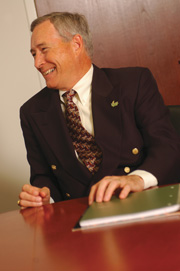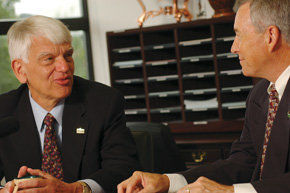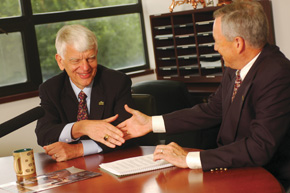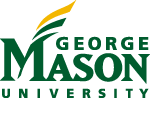President to President
On the event of President Alan Merten’s 10th anniversary with the university, Alumni Association President Peter Farrell sat down with Dr. Merten to reflect over the past decade and discuss the university’s future.
Farrell: It has been 10 years since the alumni magazine, Mason Spirit, featured a formal interview with you. As you look back over the years, how well have the Alumni Association and alumni involvement met with your expectations?
Merten: I came to Mason with the belief that a great university needs a strong relationship with its alumni in two dimensions: one, to have the alumni support the university, and two, to have the university support the alumni. I think we’ve come a long way with respect to the relationship of the university and its alumni; to the association, the leadership, and its activities; and with our alumni in general. We still have a long way to go. We’ve made the connection to alumni, but we now need to make that connection one that will serve to enhance the stature of the university.
Farrell: The Alumni Association is clearly focused on developing leaders who represent both the Mason alumni community and the university. Where do you see the opportunities for the Alumni Association to strengthen its leadership role on campus?
Merten: As we move forward at Mason, one of the most important aspects of the university is to enable our deans, our academic leaders, to be the best leaders that they can be. The deans are responsible for so many of our activities. The provost likes to say that we take most of the money we get from various resources and turn it over to the deans to spend on their students, their faculty, their staff, etc. As we move ahead at Mason, we are going to need more help from the alumni in terms of recruiting students, recruiting faculty in some cases, establishing contacts with the corporate world, and acquiring more private funds. I look forward to the different things we can do if more of our alumni were associated with the schools and colleges, developing themselves as alumni leaders, but also supporting the leadership of the dean and maybe the department chair in some of the larger colleges. That to me would be the secret of success at the next level.
Farrell: You told me a long time ago that one of the thrills you have is meeting an alumnus when you are traveling. In the past year, we’ve seen an increase of alumni successes, including a number of federal appointments. Now that our alumni base is maturing and taking on prominent roles, how do you believe this affects the public perception of the university and our image?
 Merten: At a recent retreat with the Board of Visitors and the President’s Council, we discussed the things that can impact the university’s reputation. One of the five or six things identified as important was the reputation of our alumni. As our alumni become more prominent, they bring recognition to the university, but for that to happen our alumni must go out of their way to mention they are Mason alumni when they have accomplishments. We need to concentrate on reminding our alumni that each of their successes is a success for the university.
Merten: At a recent retreat with the Board of Visitors and the President’s Council, we discussed the things that can impact the university’s reputation. One of the five or six things identified as important was the reputation of our alumni. As our alumni become more prominent, they bring recognition to the university, but for that to happen our alumni must go out of their way to mention they are Mason alumni when they have accomplishments. We need to concentrate on reminding our alumni that each of their successes is a success for the university.
There is a lot of discussion now in higher education about measuring outputs. We are good at measuring inputs and processes—such as how much money comes into the university, SAT scores—but it is hard to measure outputs. One way to measure output is to look at alumni success. We were talking this morning about a project where we surveyed 200 freshmen and their parents. The suggestion was made that maybe we should follow them for the next 8 or 10 years. See how they perform as students and how their perceptions of us change, and see how they perform as a stratified sample four or five years after [graduation]. We’ve never done that before, and it could provide valuable information.
I still get the biggest thrill, no matter where I go, when someone walks up and says, ‘I’m really proud to be a Mason alumnus.’ They did that before our run to the Final Four last March, and they do it even more now.
I just finished reviewing the press clippings for the month of March and first two or three days of April. Normally, I get every month a booklet of press clippings on the university—faculty members, alumni, students. It is usually about an inch and a half thick. March 2006 comprised four books, each about 4 inches thick. Throughout the stack, there are stories about Mason alumni all over the country and a few around the world. The alumni successes are going to increase more and more. We need to encourage people to mention their connection, we need to get out there and help them make it, and we need to get out there and tell the world about it.
Farrell: Many of the schools and units have strong ties to the business and political community in Northern Virginia and Washington, D.C. How do you envision alumni involvement in fostering those ties for the university?
Merten: First with respect to the political world, the alumni have a responsibility and, we hope, the commitment to help us in every way they can to influence political leaders. In terms of the financial side, the most important players are clearly the political leaders at the state level. We need our alumni to become more involved in influencing the General Assembly. Let state legislators know that Mason is underfunded. Let them know that they won’t get their support unless they do what’s right for Mason.
As a community in Northern Virginia and clearly as the Mason community, we have let political leaders off the hook. We find cases where they don’t do what they should, and they still get support from business leaders who are alumni and business leaders who are our friends. Enough is enough.
With respect to the corporate community, I suggest that we meet with our alumni in corporate settings and work with the Alumni Affairs Office to find out who are the alumni in that setting, in that city, and in that industry, and bring them together in other than a university setting. Specific members of the university administration should participate in these events. If we are to get more support from the corporate community, we need to show them more clearly that our alumni are a part of their companies and that these alumni make a difference.
Farrell: That’s an excellent idea. We are concentrating on some areas along those same lines. We’ve seen several engagements, including a breakfast by the School of Management, for example, that were well attended not just by business graduates but by alumni from other degree areas.
Merten: In universities, not just this one, you have some alumni who associate strictly with their school or college, but most alumni associate themselves with the university. The farther away they get [from Northern Virginia], the less concerned they are about what program other alumni graduated from and the more interested they are in getting together with other alumni. This is clearly what happened with basketball—celebrating with other alumni.
 Farrell: We are maturing as an association. In the past, we’ve focused on scholarships, alumni leadership, sports participation, and Homecoming. If we look toward the future, what two particular efforts do you feel should be the top priorities for the Alumni Association?
Farrell: We are maturing as an association. In the past, we’ve focused on scholarships, alumni leadership, sports participation, and Homecoming. If we look toward the future, what two particular efforts do you feel should be the top priorities for the Alumni Association?
Merten: I’m going to go back to what I said before. Alumni support for the deans and other senior people in the university is going to be important. We have recently restructured the university. We have a College of Science now and a College of Liberal Arts and Human Sciences. The deans face some real challenges in getting things off the ground. I think they are doing a good job, but having alumni engaged in those two colleges would be helpful. Similarly, alumni can work with the dean of the newly reorganized College of Health and Human Services to help build strength there as it broadens its perspective.
At universities, a pendulum swings between a focus on the whole and a focus on the parts. If you do a good job focusing for a while on the whole, it affects the parts. And if you focus on the parts, it affects the whole. Right now, I see us slightly shifting more toward a focus on the parts, and an alumni focus in that area would be extremely helpful. We’ve got great deans, we have emerging staff at the college level for alumni outreach, for development, for public relations, but they will need a lot of help.
I used to say this when I was a dean: Probably, the most important people are the deans. They are at that level where they can make a difference.
Another place where alumni can help, and this is broadly stated, is to assist in fund raising at all levels. If you look at the pyramid of fund raising, at the top you have a few large gifts and at the bottom you have lots of small gifts. For the alumni, the focus needs to be on whatever part of that pyramid that makes sense to an individual or a group. We are now involved in some really strategic targeted campaigns: the Campaign for Mason Students, the performing arts building at Prince William, and the Volgenau School’s campaign, just to mention a few. All these need support throughout the pyramid’s levels. And alumni can help—not only in terms of helping us themselves, but also by helping us find others who can help.
We have some great alumni who have been instrumental in connecting the university to individuals who have made significant contributions.
Farrell: What do you see as a formal or informal area for the alumni to gather from a university perspective?
Merten: Mason has made a commitment to have space for activities, and I am constantly amazed by who is on campus. It is not unusual for large community activities to happen here, although, it is an unusual role for a university. The reason is that George Mason University grew up with Northern Virginia, and at some point, not explicitly but implicitly, the community decided that Mason would have the facilities the community needed so it wouldn’t have to build them.
We are now designing a hotel and conference center that could host more events. Depending on how we design it and on possible alumni support, part of the facility could be allocated to alumni.
I think our alumni should be looking at the multiple locations we have.
We are aware that any time someone returns to the Fairfax Campus after being absent for any length of time, they are just overwhelmed by all the changes and growth.
We are building a lot—the university is changing—but I don’t think enough people see it. Alumni need to take advantage of the facilities we are building and encourage others to come to our campuses to see them. Drive around Patriot Circle, go to the Johnson Center, go to Mason for lunch. I am making a commitment and encouraging the deans to get people on campus.



